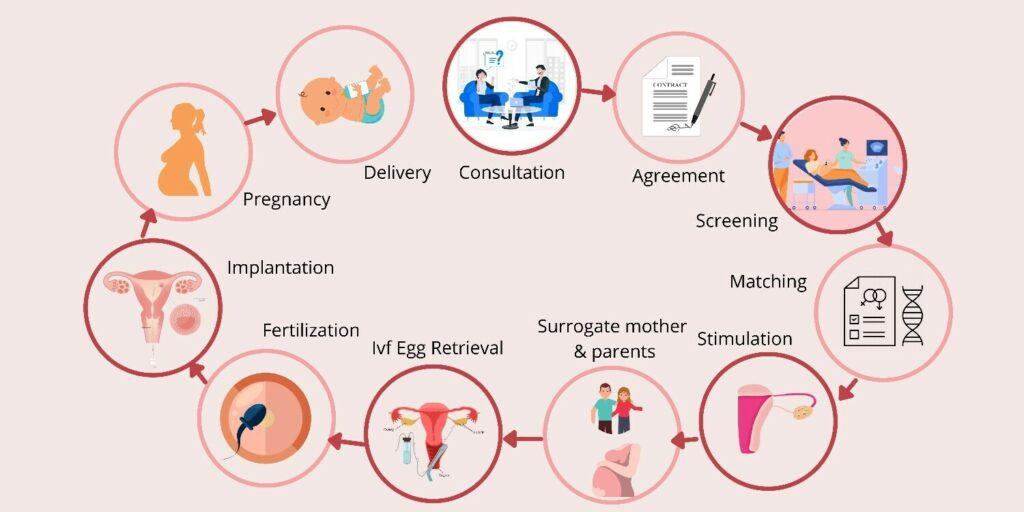- Legally Certified Assisted Reproduction Technology
- High IVF success rates of 99% with assisted Donors
- Ideally Located for all means of transportation
- A very friendly experienced professionals
- Free first consultation: Book an appointment
- Call/W: 919311850412 Email: info@fertilityworld.in
The first goal of in-vitro fertilization (IVF) is to give hope the chance to become pregnant by using her own or from a donor’s oocytes and sperm cells from her partner or a donor. To achieve success in such a complicated process, several factors should be put into consideration. In Vitro Fertilization, as a fertility treatment, is a complex series of procedures that is reliant on proper timing and accuracy. The probabilities of a successful IVF treatment depend on the following conditions:
- Age- Women between the age of 24 to 34 years old have the highest likelihood of a successful IVF treatment. This age range is considered to be the most fertile and most reproductive age. As the woman crosses the age of 40, the success rates of reproductive decrease.
- Egg number- Factors like age, ovarian reserve, and stimulation protocol affect both the egg cells’ and embryos’ quality. If the patient’s egg quality is compromised (because of age and other related factors, the use of a donor egg is an option to increase the chances of success).
- Sperm count and motility- If the male partner has fertility issues, then the treatment process success rate will also be affected.
- Uterine and tubal factors- Just like embryo quality. This factor has a critical role in establishing a healthy pregnancy in successions of assisted reproduction. In turn, influences are affecting such receptivity. It includes uterine lining thickness, immunological factors, and the outline of the uterine cavity.
- Patient’s Lifestyle- The patient’s way of life is one factor that is important in creating a thriving, healthy environment for an embryo. Smoking, drinking alcohol can decrease the IVF success rates. Maintaining a healthy weight, obesity would affect how hormones and fertility drugs are processed by the body.
Fertility World General IVF success rates pie chart 2021 are shown below:
| IVF SUCCESS RATE | PERCENTAGE |
| IVF With Donor Eggs | 80 to 99%% |
| IVF With Self Eggs | 70% |
| IVF With Donor Sperms | 70% |
| IVF With Self Sperms | 75% |
| IVF With ICSI | 85% |
| IVF With FET | 60% |
| IVF with PESA | 55% |
The Fertility World is confident and proud to announce its committed IVF success rates in Canada. The Fertility World traps its best and easy ways which will make things easier for its infertile patients to understand and to avoid misleading or exaggerated statistics. Our success rates in IVF have been certified and our statistics are verified by the authorities. We understand that each patient is unique in their way. With this understanding, we lay out our success rates in Canada.
However, if you’re searching for IVF with high success rates in Canada. The Fertility World recommends your chance of pregnancy must be discussed with our professional doctor in person or through various social platforms provided. Based upon your previous infertile reports, the chances of your IVF success rate may be higher or lower than our average statistics.
Let us Discuss and Understand…
How IVF is performed at the Fertility World in Canada?
At Fertility World IVF is performed in the following steps respectively:

1. Consultation: Once you book an appointment, at no time our coordinators will schedule your direct consultation with our fertility experts through phone calls or consult in person based on your location. Our experienced Doctors will evaluate your fertility problems or rectify your conditions on your previous fertility report. Our experts answer all your queries with a very friendly attitude and provide you a comfortable environment. Based upon your conditions, our Doctors will suggest the next step.
2. Ovulation Induction: After you agreed to IVF treatment, for up to 8-14 days you (female) would be injected with fertility drugs such as follicle-stimulating hormone (FSH), luteinizing hormone (LH). It boosts the natural levels of these hormones normally present in your body to encourage your body to produce more than one egg to develop (stimulation) per month.
During this ovulation cycle, our fertility specialist will monitor your ovaries follicles development through blood tests and ultrasounds. You’ll be monitored more frequently at the end of the stimulation phase for timing the “trigger injection” perfectly. Trigger timing is very crucial, as the fertility specialist has to perform the egg removal before you ovulate.
3. Egg removal/retrieval: This step is conducted in a hospital where our embryologist collects the egg from the ovaries. You may be sedated with general anesthesia to let you sleep for 20 to 30 minutes during the egg removal.
The embryologist uses advanced ultrasound technology that guides a needle into each ovary to be retrieved. This needle has a device attached to it that suctions the egg out at a time. It is a very delicate procedure, our skilled embryologist performed egg pick up precisely. The eggs are invisible to the naked eye, they are contained within the fluid-filled follicles in your ovaries. The average number of eggs retrieved is between 8 to 15, the numbers picked up also depend on your age and clinical history.
4. Sperm collection: If you’re a couple and planning to use your husband’s sperm, your partner will provide a sperm sample via masturbation. Also, you can use donor sperm, preserved sperm if your partner is infertile. The sperm are then put through a high-speed wash and spin cycle to find the healthiest sperm. Our specialist will provide you with the best viable sperm under a powerful microscope. The viable sperm is not too fat nor too thin, its tail is not too long nor too short having a normal morphology. It requires great skills to identify a viable shape and size of the sperm where our specialists are well acquainted with it.
5. Fertilization and embryo development: The most viable sperm prepared are then combined with the retrieved eggs in the laboratory under a culture medium in Petri-plates or test tube fertilization outside the body (IVF) or known as a test-tube baby. The sperm are united with the egg via the conventional method (inseminating) or using intracytoplasmic sperm injection (ICSI). The method of Fertilization is directed by the experts based on your situation to optimize higher chances of pregnancy.
After insemination, inseminated eggs are placed in culture incubators to assess for fertilization for about 17 hours. After identifying 2 pronuclei, the embryo is developed. The developing embryos are kept in perfect conditions under special amino acids, nutrients that are normally present in our body for embryo development. The embryo is observed for 5 to 6 days.
- A two- to four-cell embryo on day two
- A six- to eight-cell embryo on day three
- An embryo of roughly 100 cells by day five or six (Blastocyst stage)
6. Embryo implantation: A developed blastocyst stage embryo is selected for implantation into your uterus. Before implantation, you may be prescribed another medication for preparing the lining of your uterus.
The Doctor will place the embryos into your uterus using a catheter, this process also takes place under the doctor’s office while you are awake. Multiple embryos may be implanted into your uterus in the hope that at least one will implant itself in the lining of your uterus and begin to develop. In some cases, more than one embryo ends up implanting which can produce twins.
This step is a very simple process and takes about only 5 minutes
7. The pregnancy blood test: After about two weeks of embryo transfer, a blood test is conducted to measure the levels of human chorionic gonadotropin (hCG), which indicates a positive pregnancy. After confirmed pregnancy, you can carry your pregnancy as naturally as others, and continue your daily activities. You will be scheduled for a check-up to know the health and heartbeat of your baby.
How long does IVF treatment take?
IVF has a series of procedures, each step has its process of time such as:
- Consultation: If you have the previous infertility report then consultation hardly takes 3 to 5 days.
- Ovulation: It takes about 2 to 3 weeks.
- Egg retrieval: It takes about two weeks. However, it may take a few months for pregnancy to be achieved.
- Pregnancy: 9 months
Our experts schedule a routine for the patients to follow. However, some people get pregnant with IVF on their first cycle, while some people take more than one IVF cycle to get pregnant. This treatment does not increase a patient’s chances for pregnancy if they are experiencing fertility problems. Everyone has a different body, and this will not work for everyone. However, 99% of our patients have conceived and delivered a baby through our IVF treatments.
If you’re looking for IVF treatments in Canada, Fertility World provides outstanding IVF treatments with higher success rates. For more information, Book an appointment now!



One thought on “IVF Success Rates in Canada | IVF Success rate by Age”